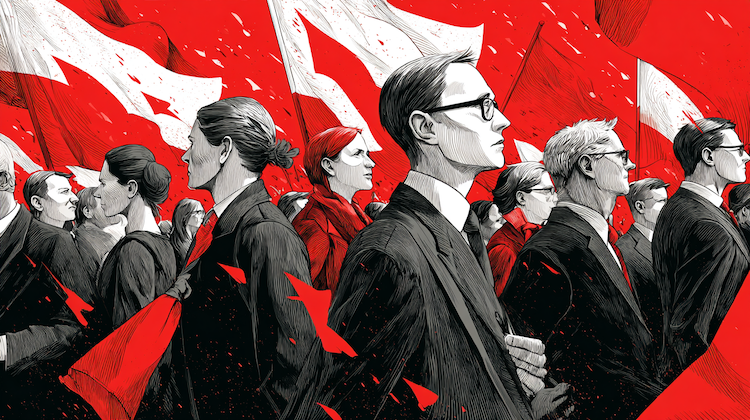A razor-thin victory for the national-conservative Law and Justice Party reveals deep societal divisions and a broader erosion of centrist coalitions across the West.

Karol Nawrocki, representing Poland’s national-conservative Law and Justice Party, has narrowly won the country’s presidential election, defeating Rafał Trzaskowski, the pro-European mayor of Warsaw and member of Donald Tusk’s Civic Coalition, with 50.9 percent of the vote. Voter turnout reached a record 71.6 percent, a striking sign of how deeply engaged, and divided, Polish society has become. As in many Western democracies, the result reveals a nation split down the middle: between conservative rural provinces and progressive urban centres, between nationalism and liberal internationalism.
This outcome extends beyond the local context, acting as a warning for the broader crisis facing liberal democracy globally. The stark divide in Poland mirrors a larger pattern across the West: the weakening of the centrist coalitions that once underpinned liberal governance, particularly in the decades following the Cold War. The collapse of the Soviet Union not only reshaped the global map but also subtly removed a crucial narrative tool for liberalism – the clear contrast with an illiberal adversary.
Without a distinct external enemy, the liberal project lost a potent source of unity: the capacity to position itself as a necessary defence against an illiberal threat. In the subsequent decades, centrist elites struggled to maintain coherence, while populist challengers exploited increasing tensions between market openness and social protection, and between cosmopolitanism and community. Liberalism’s decline was not solely due to voter backlash; it also suffered from a fatigue of its own narrative.
The post-war liberal order was never ideologically uniform. It encompassed a set of internal contradictions: between market openness and social cohesion, between international cooperation and national control, and between elite cosmopolitanism and local communities. The glue that held this coalition together was not internal consistency, but external contrast. Liberal democracy, however flawed, stood in opposition to a visible, illiberal alternative.
This adversarial framing served to justify liberalism’s internal tensions in the West since the Second World War. Expanding global markets and rising inequality could be tolerated, even rationalised, in the name of preserving a free society. Supranational institutions and technocratic governance, often insulated from direct democratic accountability, were viewed as stabilising forces, essential for long-term security and prosperity. The sacrifices demanded by liberal democracy were understood as preferable to the costs of ideological surrender.
The dissolution of the Soviet Union disrupted this logic. With the end of the Cold War came the disappearance of liberalism’s most effective foil. The narrative that had once provided coherence and urgency to the liberal project waned. What emerged in its place was not a triumphant reaffirmation of liberal values, as some had hoped, but a growing unease with the project itself.
In the years since, social scientists have sought to understand the erosion of support for liberalism through two broad lenses. The first pertains to discontent stemming from economic shocks, job displacement caused by globalisation, and automation. The second relates to cultural anxiety associated with migration and societal change. Both explanations centre on shifts in the demand for liberal policies.
While these demand-side factors remain crucial, they do not provide the complete picture. The liberal order did not simply fall victim to disgruntled electorates; it also suffered from the supply side – the decisions and discourse of political elites, particularly their failure to offer compelling narratives capable of sustaining a broad coalition. The Cold War’s structuring presence had afforded centrist elites a form of discursive licence: they could present liberal democracy as the Churchillian least-worst option, obscuring genuine tensions within the system. Once that licence expired, liberalism had to defend itself on its own merits and found it increasingly challenging to do so.
Tensions between market openness and social protection, international cooperation and national sovereignty, and elite cosmopolitanism and local community became more politically significant. What had once been seen as pragmatic compromise now appeared as incoherence. This shift created opportunities for challengers. Populist leaders across the political spectrum have since capitalised on the frictions long inherent within the liberal project. They have given a voice to constituencies who felt ignored by the centrist consensus, those who experienced liberalisation not as freedom, but as displacement. They have reframed liberalism not as a hard-won good, but as a self-serving ideology of elites.
This is not to suggest that the liberal project lacks inherent value today. However, projects of value still require coherence to be politically sustainable. Liberalism’s normative commitments – to pluralism, institutional constraint, and open debate – must be rooted in a vision that resonates with the populace. When that resonance weakens, liberalism’s internal contradictions solidify into vulnerabilities.
One might pose the question: what lies ahead? Could a new adversary, perhaps in the European context China, Russia, or even a figure like Mr Trump, once again provide the structuring tension that liberalism lost after 1989? It is a possibility, but such external threats no longer unify in the same way they once did. In many democracies, public opinion is more divided over how to respond to illiberal forces than on whether they even constitute a threat. The adversarial framing that once held liberal coalitions together now contributes to further fragmentation.
If liberalism is to endure, it cannot rely on enemies to define its worth. It must cultivate its own political language, one capable of acknowledging the costs of globalisation, reaffirming the importance of national and local community, and making a compelling case for democratic pluralism without resorting to abstraction or inevitability.
This task extends beyond mere rhetoric; it demands political imagination and institutional reform. If liberal democracy is to be more than simply the absence of authoritarianism, it must demonstrably improve in providing voice, security, and a sense of belonging.
The Cold War facilitated the holding of the centre. Its conclusion has made the work more challenging, yet also more essential. Now, the coalition that once defended liberalism must be rebuilt, not through fear of an external threat, but through a credible vision of what liberal democracy can offer, and to whom. That, rather than a resurgent adversary, is what might ultimately restore liberalism’s resilience.
Catherine de Vries holds the Generali Endowed Chair in European Policies and is a Professor of Political Science at Bocconi University. She also serves as President of the Institute of European Policy Making at Bocconi University and is co-chair Bocconi’s International Advisory Council.
